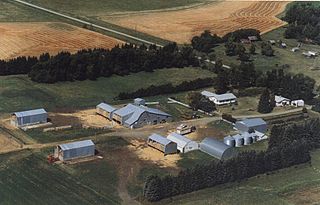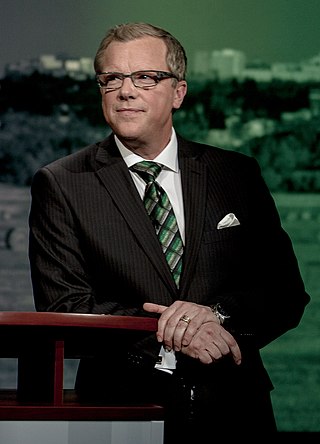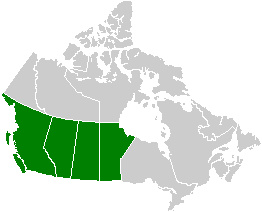
Saskatchewan is a province in Western Canada, bordered on the west by Alberta, on the north by the Northwest Territories, on the east by Manitoba, to the northeast by Nunavut, and on the south by the United States. Saskatchewan and Alberta are the only landlocked provinces of Canada. In 2023, Saskatchewan's population was estimated at 1,221,439. Nearly 10% of Saskatchewan's total area of 651,900 km2 (251,700 sq mi) is fresh water, mostly rivers, reservoirs, and lakes.

The Saskatchewan Party is a conservative political party in the Canadian province of Saskatchewan. The party was founded in 1997 by a coalition of former provincial Progressive Conservative and Liberal Party members who sought to unite opposition to the governing New Democratic Party. Since 2007, the Saskatchewan Party has been the province's governing party, and both the party and the province are currently led by Premier Scott Moe.

The Canadian Prairies is a region in Western Canada. It includes the Canadian portion of the Great Plains and the Prairie provinces, namely Alberta, Saskatchewan, and Manitoba. These provinces are partially covered by grasslands, plains, and lowlands, mostly in the southern regions. The northernmost reaches of the Canadian Prairies are less dense in population, marked by forests and more variable topography. If the region is defined to include areas only covered by prairie land, the corresponding region is known as the Interior Plains. Physical or ecological aspects of the Canadian Prairies extend to northeastern British Columbia, but that area is not included in political use of the term.

The Saskatchewan Progress Party (SPP) is a liberal political party in the Canadian province of Saskatchewan. It was founded in 1905 as the Liberal Party of Saskatchewan, and retained that name until members voted to change it in 2023. Until 2009, the party was affiliated with the Liberal Party of Canada.
The Saskatchewan New Democratic Party (NDP) is a social-democratic political party in the Canadian province of Saskatchewan. The party was founded in 1932 as the Farmer-Labour Group and was known as the Saskatchewan section of the Co-operative Commonwealth Federation (CCF) from 1935 until 1967. The NDP currently forms the Official Opposition and is led by Carla Beck.
The New Brunswick New Democratic Party is a social-democratic provincial political party in New Brunswick, Canada linked with the federal New Democratic Party (NDP).

The Saskatchewan Green Party is a political party in Saskatchewan, Canada.

Bradley John Wall is a Canadian former politician who served as the 14th premier of Saskatchewan from November 21, 2007, until February 2, 2018. He is the fourth longest-tenured premier in the province's history.
The Green Party of Manitoba ('GPM') is a green provincial political party in Manitoba, Canada, founded on November 11, 1998. The party is legally autonomous from the Green Party of Canada, though for several years many of its members also belonged to the Green Party of Canada in Manitoba, a federal organization established in 1996. The GPM has maintained a position as the fourth largest party in Manitoba since the 2003 election until the 2023 Manitoba general election, both in the number of votes received and candidates run.
The Green Party of Canada ran a full slate of 308 candidates in the 2004 federal election. Some of these candidates have separate biography pages; relevant information about other candidates may be found here.

The Craik Sustainable Living Project (CSLP) is a nonprofit organization for sustainable development that aims to advance the local use of more ecologically sound technologies and ways of living in rural Saskatchewan, Canada. The four key components of the project are the eco-centre, outreach and education programs, community action, and the ecovillage.

Natural burial is the interment of the body of a dead person in the soil in a manner that does not inhibit decomposition but allows the body to be naturally recycled. It is an alternative to typical contemporary Western burial methods and modern funerary customs.

Western alienation, in the context of Canadian politics, refers to the notion that the Western provinces—British Columbia, Alberta, Saskatchewan and Manitoba—have been marginalized within Confederation, particularly compared to Ontario and Quebec, Canada's two largest provinces. Expressions of western alienation frequently allege that those provinces are politically over-represented and receive out-sized economic benefits at the expense of western Canadians.
Dustin Duncan is a Canadian politician. He is the Saskatchewan Party member of the Legislative Assembly of Saskatchewan for the constituency of Weyburn-Big Muddy. Duncan was first elected in a 2006 by-election when he was 26 years old.
The Saskatchewan Marijuana Party was a provincial political party based in Saskatchewan, Canada. The party contested the 2007 Saskatchewan general election and failed to win any seats, securing less than one percent of the vote.
The Politics of Saskatchewan relate to the Canadian federal political system, along with the other Canadian provinces. Saskatchewan has a lieutenant-governor, who is the representative of the Crown in right of Saskatchewan; a premier—currently Scott Moe—leading the cabinet; and a legislative assembly. As of the most recent provincial election in 2020, the province is divided into 61 electoral districts, each of which elects a representative to the Legislature, who becomes their member, or MLA. In 2020, Moe's Saskatchewan Party was elected to a majority government. Regina is the provincial capital.
Peter W. Prebble is a Canadian politician and environmentalist. He was an elected representative in the Legislative Assembly of Saskatchewan for 16 years between 1978 and 2007 and has been a longtime member of the Saskatchewan Environmental Society.

Scott Moe is a Canadian politician serving as the 15th and current premier of Saskatchewan since February 2, 2018. He is a member of the Legislative Assembly of Saskatchewan for the riding of Rosthern-Shellbrook, first elected in 2011. He served in the Saskatchewan Party cabinet from 2014 to 2017 under the premiership of Brad Wall, twice as minister of environment and also as minister of advanced education. In January 2018 he was chosen to succeed Wall as leader of the Saskatchewan Party. He led the party to a fourth consecutive majority mandate in the 2020 provincial election.

The Maverick Party, formerly known as Wexit Canada, is a Canadian federal political party. It advocates for constitutional changes to benefit, or the independence of, Western Canada, which includes British Columbia, Alberta, Saskatchewan, Manitoba, Yukon, Northwest Territories and Nunavut. The party has its roots in Alberta separatism and advocates the use of grassroots politics.

The Buffalo Party of Saskatchewan is a conservative, populist, and separatist provincial political party in Saskatchewan. The party was established in 2020 and contested its first election that same year.











